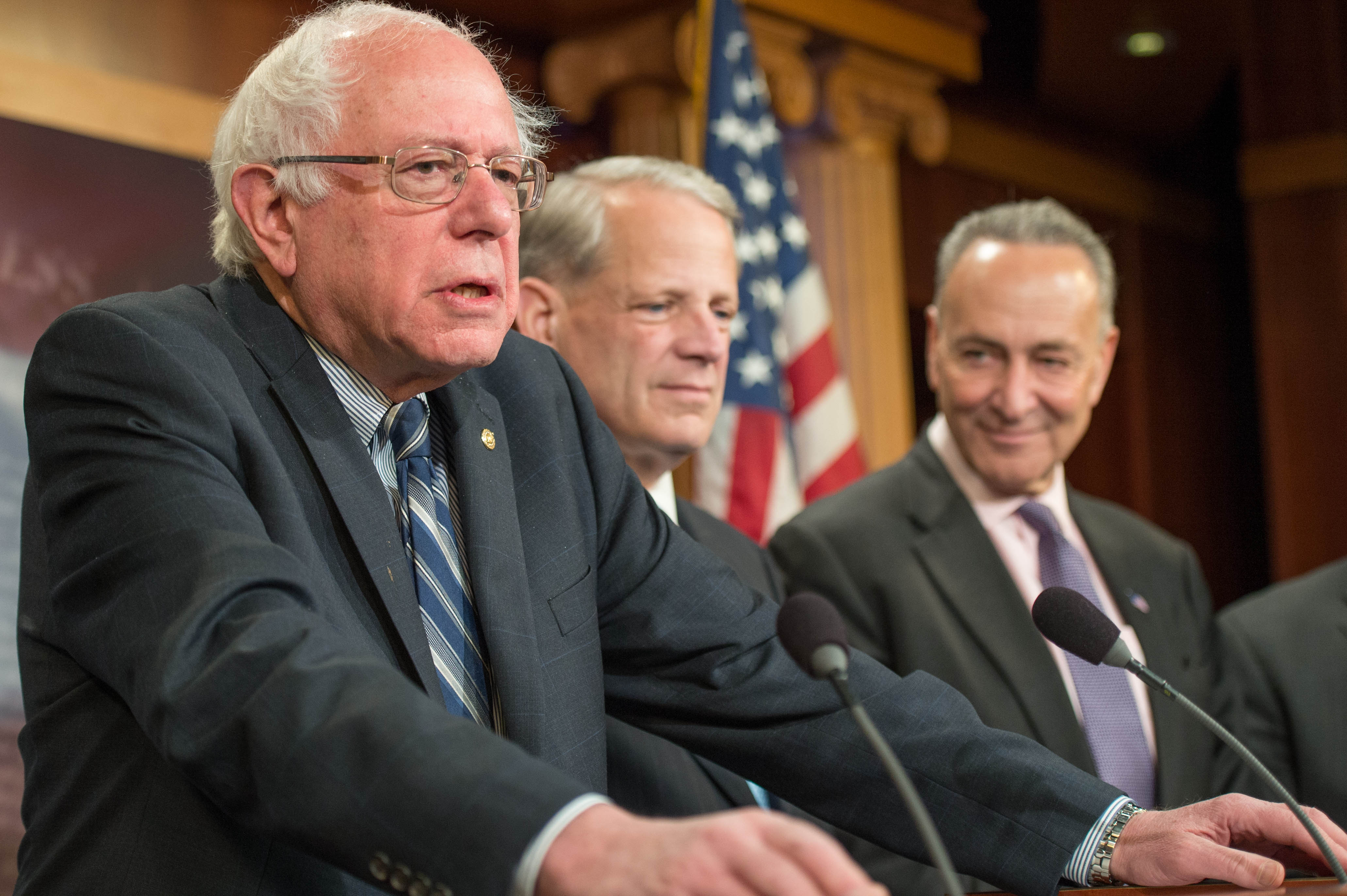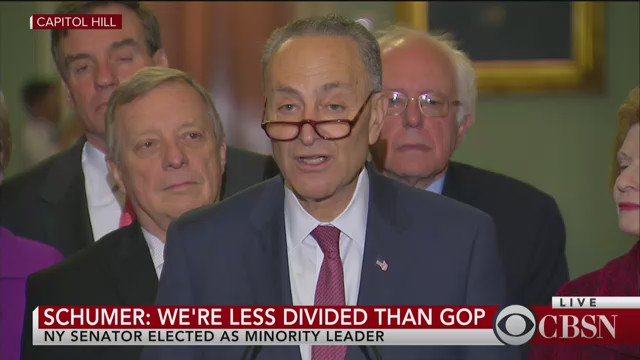WASHINGTON November 16, (Sinclair Broadcast Group) — Senate Democrats chose their new leadership on Wednesday, bringing together a diverse group to steer the party following major losses in the last election.
Among the major shakeups to the party’s leadership was the addition of Bernie Sanders (Vt.), the self-defined democratic socialist who only officially joined the Democratic Party when he announced his candidacy for president in April 2015. After running a high-profile, energizing presidential campaign, Sanders was tapped to lead the party’s outreach efforts. According to one Midwest senator, Senator Chuck Schumer (N.Y.) the party’s new leader, specifically created a leadership position for Sanders, by dividing an existing position between Sanders and Amy Klobuchar (Minn.).
The new leadership coalition had a lot of familiar faces, but included new roles to accommodate a range of Democratic views, from Bernie Sanders on the left to West Virginia Senator Joe Manchin at the conservative end of the spectrum. The progressive senator from Massachusetts, Elizabeth Warren, will also have a seat at the leadership table, sharing the vice chairmanship of the conference with Virginia’s Mark Warner.
Sen. Schumer described the team as “ideologically and geographically diverse.” He argued that bringing together the party’s different blocs into one leadership structure shows “we can unite the disparate factions of our party and our country.”
Striking a tone of contrition, Schumer prefaced the leadership announcement by acknowledging the losses in the 2016 election, results the Democrats “can’t ignore.”
“We heard the American people loud and clear,” Schumer said. “They felt that the government wasn’t working for them. They felt that the economy was rigged against them in many places and that the government was too beholden to big money and special interests.”
The new minority leader’s message clearly echoed the tone of Sen. Sanders’s campaign, a tone that was radically different from the one typically expressed inside the Washington beltway and which resonated with millions of Americans. Sanders rallies attracted tens of thousands of supporters. He mobilized young voters and succeeded in raising millions of dollars from small contributions averaging $27. The once obscure Independent senator, largely ignored by his Senate colleagues, shook the party with his success.
Sanders move into a Democratic leadership post has its ironies, as many of his ideas contradict establishment views and political tactics. At the top of his political agenda, Sanders repeatedly demanded an end to the influence of big money on government, those large campaign contributions he says are made specifically to influence America’s elected officials.
In that way, Sanders “revolution” runs counter to Democrats’ (and Republicans’) fundraising orthodoxy, that you need big donors to contribute big dollars to build the political machine to win elections. While some progressive scorned the influence of lobbyists, Wall Street and shady SuperPACs, Democrats have received hundreds of millions of dollars from those very sources throughout past election cycles. In 2012, the Democratic Senatorial Campaign Committee (DSCC) raised $2.8 million from lobbyists. In 2013, an off-year for elections, Wall Street was the top source of funding for both parties, pouring in more than $490 million in contributions and lobbying efforts.
Minutes after Schumer announced Bernie Sanders’s new role as the Chair of Outreach, Sanders was telling Capitol Hill reporters that “the caucus is going to have to have the guts to stand up to the billionaire class.”
Sanders continued that Democrats have to understand the message he took out on the campaign trail, namely, that the government must take steps to address income inequality, and “take on” corporate America, Wall Street, big oil, and the pharmaceutical industry.
Sen. Debbie Stabenow (Mich.), whose name has been floated to fill the still-vacant seat as chief fundraiser at the DSCC, was quick to praise Sanders, saying “there was never a situation where Sen. Sanders did not have the respect and admiration in our caucus.”
During a primary campaign between Hillary Clinton and Sanders, the traditional Democratic party stalwarts steered clear of Sanders, putting their support behind Hillary Clinton’s campaign, despite the wave of popular support and excitement Sanders was generating. As the party united behind Clinton at the Democratic convention in Philadelphia this summer, WikiLeaks dumped over 20,000 DNC emails showing efforts within the party apparatus to discredit Sanders and ensure Clinton’s nomination.
By the end of the primary, every Democratic Senator, with the exception of three, put their support behind Hillary Clinton, a career Washington insider, who ultimately lost to the populist, anti-establishment outsider, Donald Trump.
On Election Day, the Democratic Party not only lost the White House, but Republicans maintained their control over the Senate and the House of Representatives. At the state level, there are now only 17 states solidly controlled by Democrats and 32 with Republican governors and legislatures. Bernie Sanders responded to the losses from his new leadership post, telling reporters, “We can’t just keep doing the same old and keep losing!”
Sen. Manchin was even more blunt in analyzing the blow dealt to Democrats in the last election. “There was never a plan,” Manchin said of the party’s message in the election. The party left too many voters behind. Middle-class and low income working Americans, and those who had lost their jobs in recent years felt the Democrats “didn’t care,” he stated.
From his new leadership post, Manchin will focus on reaching across the aisle, finding common ground with Senate Republicans and the new Trump administration. “I’ll sit down with President-elect Trump and his staff,” Manchin emphasized, noting that despite major differences with Trump, he already sees some common ground.
Moving forward, Senate Democrats appear to have reached a consensus that they are ready to work with the GOP-controlled Senate, House and the Trump administration where they can find common cause. Despite being in the majority, the GOP still only has 51 members, which means Democrats can filibuster, blocking their Republican colleagues from the 60 votes needed to advance almost every piece of legislation.
“We’re not coming here to block things,” Manchin assured. Schumer explained that the party would look at legislation on its merits, and not oppose a bill “just because” it came from Donald Trump. Where the two parties disagree fundamentally, Schumer pledged to work as an “emergency brake” on the administration.
Already, Democrats are identifying some promising policy areas where they see Trump more likely getting the support of liberals than from members of his own party.
“On many economic issues, President-elect Trump, and his campaign, was closer to us than to Republican leadership,” Schumer said.
Stabenow cited Trump’s opposition currency manipulation by U.S. trading partners, calls to close tax loopholes for companies that send jobs overseas, and some other tax reforms impacting American manufacturers that align more with the Democrats’ agenda. “The real question is whether or not the Republicans in the House and Senate will support what President-elect Trump is saying,” she commented.
On Wednesday morning the Senate GOP also held their leadership elections. With the exception of Cory Gardner, a rising star from Colorado, joining the party’s leadership, there were no changes. Senate Majority Leader Mitch McConnell (Ky.) won his reelection with unanimous consent.
The House GOP voted on Tuesday to keep Paul Ryan as Speaker, and their leadership structure also stayed largely the same. House Democrats are showing signs of turmoil and have postponed their leadership elections until Nov. 30. The move has been interpreted as a rebuke of long-time Democratic leader Nancy Pelosi.
Permanent link:http://wjla.com/news/connect-to-congress/bernie-sanders-gets-a-leadership-seat-as-senate-democrats-broaden-their-coalition









